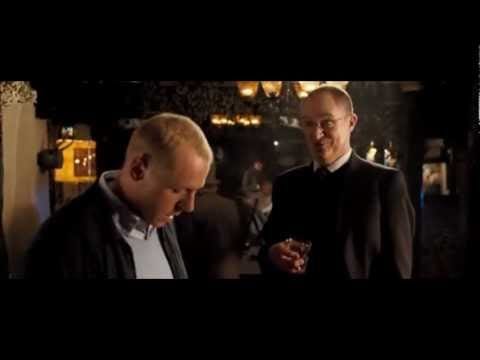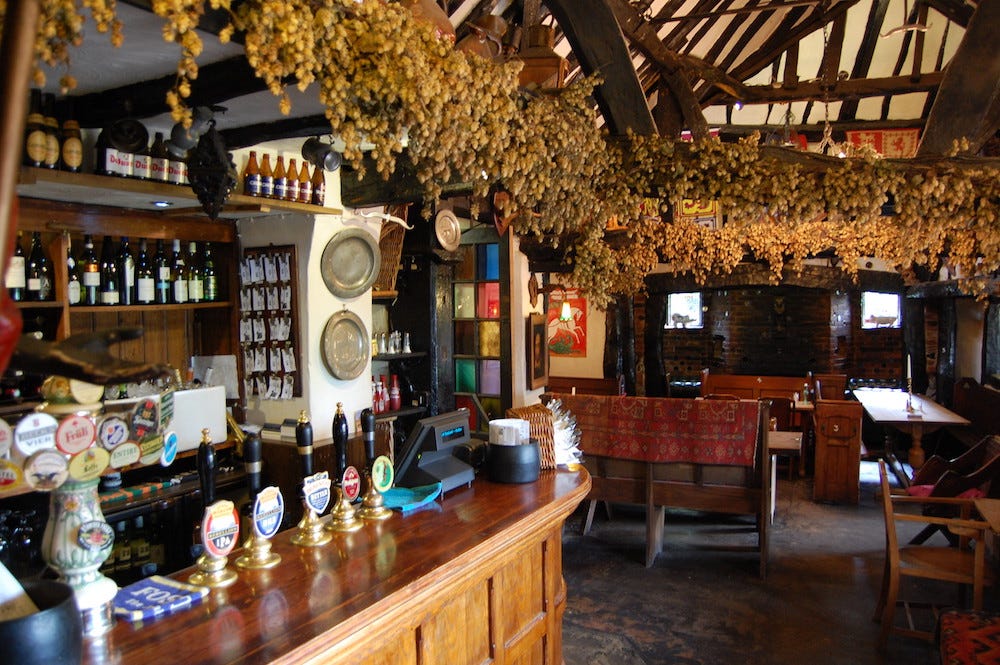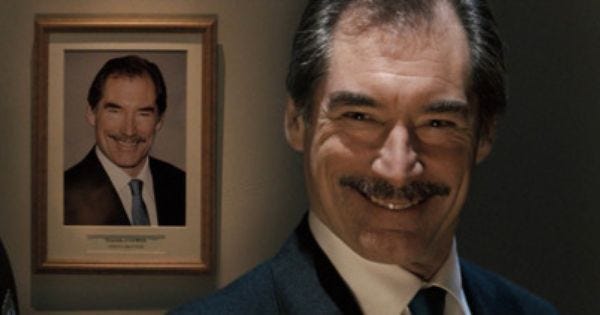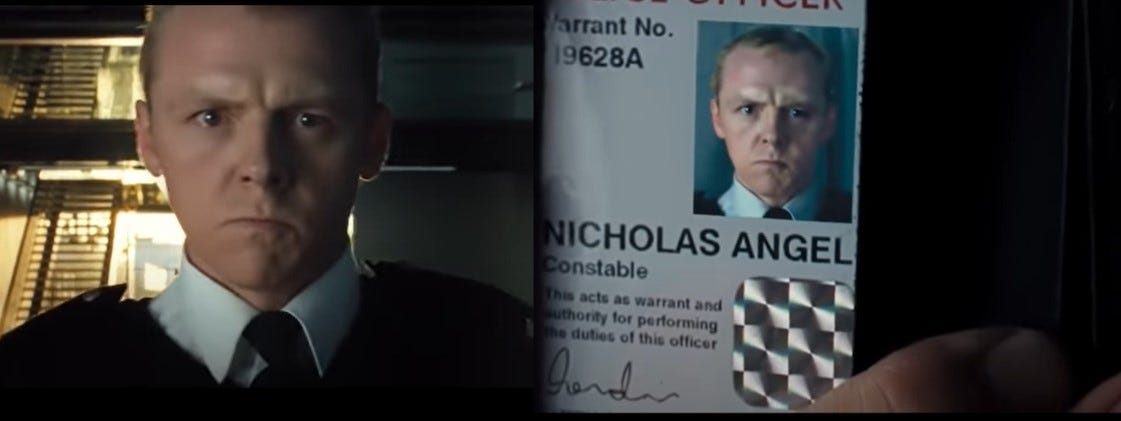Hot Fuzz and the romance of pubs
What can my favourite British comedy film tell us about lockdown easing and the role boozers play in friendships?
Simon Pegg, Nick Frost and Edgar Wright’s The Three Flavours Cornetto trilogy spawned two films (Shaun of the Dead & Hot Fuzz) that act as a time capsule of noughties Britishness. (Let’s ignore the disappointing third film The World’s End). Shaun of the Dead and Hot Fuzz depict white enclaves (Crouch End, north London and the fictional village of Sandford) and a pub culture familiar to many. Shaun of the Dead may have centred around the safe haven from zombies provided by The Winchester (in real-life the Albany, near me in New Cross, now flats) but Hot Fuzz is the film that paints pubbing realistically. Hot Fuzz is much more than a great comedy film for me it is my virtual pub: warm, friendly, familiar and a go-to place when I need a pick me up. This could be because Hot Fuzz is the funniest work Frost and Pegg have done but it’s actually the film out of the trilogy that has the most touching friendship (and old actors relishing gunfights).
The plot, if you’ve not seen it, is about a London cop Nicholas Angel (Pegg) who is sent to a West Country backwater where not much crime is seemingly committed. However, underneath the picturesque setting (it was mainly filmed in Wells in Somerset) lies a brutal darkness. The village may seem tranquil, with happy inhabitants but the elders act ‘for the greater good’ by murdering people they don’t like. I’ve watched Hot Fuzz far too many times and I won’t bore you with any of my geeky trivia. I definitely won’t say stuff like the hierarchy of police at the start - Martin Freeman, Steve Coogan, Bill Nighy - reflects the box office clout of the comedy actors in 2007 or that Cate Blanchett is in an uncredited role. Instead I want to focus on the hope it gives me each time I watch it. I find it so soothing because when it came to the crunch Frost’s Danny Butterman chose his friend, Nick Angel, over his family. I also now find it endearing that it shows a friendship started in a pub and with firm bonds over pints.
It’s a pastiche of action films - particularly Lethal Weapon, Bad Boys and Point Break - but you don’t have to even like those movies (I’m indifferent to them) to love Hot Fuzz. It’s the best movie sitcom by far. And the best advert for the pub. But, with lockdown easing, and pub beer gardens filling up do you have a sense of unease that things are really real? Despite the falling infection rates (from a third lockdown) are we now being a bit like Sandford and hiding from reality? Is it also a good thing to romanticise pubs when the bombardment of marketing that has met their reopening must’ve been very difficult for people with addiction issues? Surely adverts like these must be destructive to anyone who has been suffering with mental health issues and lacking social contact?
Yesterday walking in Greenwich I felt a feeling of sudden joy after seeing a couple sitting on a table outside a pub. I wasn’t happy because they were drinking pub pints after a long wait but instead I was instantly soothed by the sight of two people feeling welcome in someone else’s lounge. This lounge may have been on the pavement, it may have been waited on and the drinks may be expensive but for the first time in months I saw someone at home in someone else’s home.
This idea of a pub as a home is a complete romanticisation, though. And it’s one that has been peddled by the government, by Wetherspoons and, admittedly, by me in various beer articles. It’s at best how I feel when I visit certain pubs when I’m in a good mood but at worst it’s a place that I feel awkward at especially if I’m the only non-white punter.
Also if the government wants us back in our home-away-from home shouldn’t the staff be offered vaccinations and treated like key workers? What a hypocritical place ‘home’ is when its occupants are both vital and expendable. Good job our nurses and teachers are treated very differently.
If I’m in the right mood, though, and thinking about pubs The Anchor in Sevenoaks comes first into my mind. It’s run by Barry who used to open on Christmas day and then drive his regulars home. “They have no family. The pub is their family.” He told me once. I also think of the pub in Waterloo where the landlord was giving away crisps after a general election to cheer up his Labour voting punters. And I think of The Crown in Hot Fuzz (actually the Royal Standard in Beaconsfield).
The Crown may be run by two mass murderers, it may have a shockingly lax policy on underage drinking but it’s where Danny (Frost) and Nick (Pegg) became friends. Danny may be a bit too old to be spending his time quoting He-Man and Nick may be too uptight with his peace lily and cranberry juices but they’re the perfect couple, willing to make compromises and meet each other halfway. Danny and Nick are chalk and cheese but they somehow work as a pair.
And that’s what Hot Fuzz is like. On the one hand it’s very British but on the other it’s very Hollywood with it’s jump cuts, slow motion gun battles and car chases. It’s two contradictory things, like longing for pub pints but feeling a bit uneasy about the safety of drinking in them during a global pandemic.
There’s a lot of physical humour in Hot Fuzz but the best jokes are the recurring one-liners about houseplants, cornettos and model villages. I do like the sight gags, though, and numerous ones are spotted only after repeat viewings, like Timothy Dalton’s moustache (above) or the police badge at the start (below). I guess that’s why I’ve watched the film more than Shaun of the Dead and Spaced.
The only problem with Hot Fuzz is it’s earned too much goodwill from me towards Pegg, Frost and director Edgar Wright. The list of subsequent disappointments reads like a charge sheet for a criminal gang. Pegg and Frost’s alien sci-fi film, Paul, was awful. Pegg’s How to Lose Friends & Alienate People (made a year after Hot Fuzz) was as abysmal as you’d imagine a film about Toby Young would be. And I found Wright’s Baby Driver utterly charmless.
But they gave me Hot Fuzz and without this film I wouldn’t have such an instant hit of comfort. It’s my chicken soup.
Danny (Frost) would definitely have visited beer gardens this Monday. He would have been wearing shorts (despite the rain) and would have taken the day off work. He would want to play on the fruit machines (forget it!) but ended up feeling bored because Nick (Pegg) wouldn’t have visited even just for a cranberry juice. Although Danny’s very silly I don’t think he believes Covid conspiracy theories. “This shit just got real!”
Nick would probably visit the pub, masked, after he gets his second jab. He then would ask people to social distance, interrogate them about their social bubbles and force people to reveal their movements. Nick’s not had a great pandemic. Nor would you want to go to the pub with him. Ever.
Nick and Danny show that friendships can transcend great differences and they remind me of the type of relationships I have with my mates. Nearly all my friends are from contrasting backgrounds, have dissimilar interests and, at times, contrasting political views. But watching out for each other is the one common thread in all my friendships. Because it’s something that my family never did - like Danny’s whose Dad is part of the murderous cabal.
The pub is just a setting for these friendships as they will always endure in spite of these tough times we live in. As Danny would say “They’re off the fucking chain!” It’s not pubs that keep us going but our friends.
Next week I want to write more about this topic but instead I’ll focus on lost friendships. I wanted to do this by watching Boston Kickout but I can’t find the film. So instead might look at Ghostworld. It’s available on BFI Player and Prime






